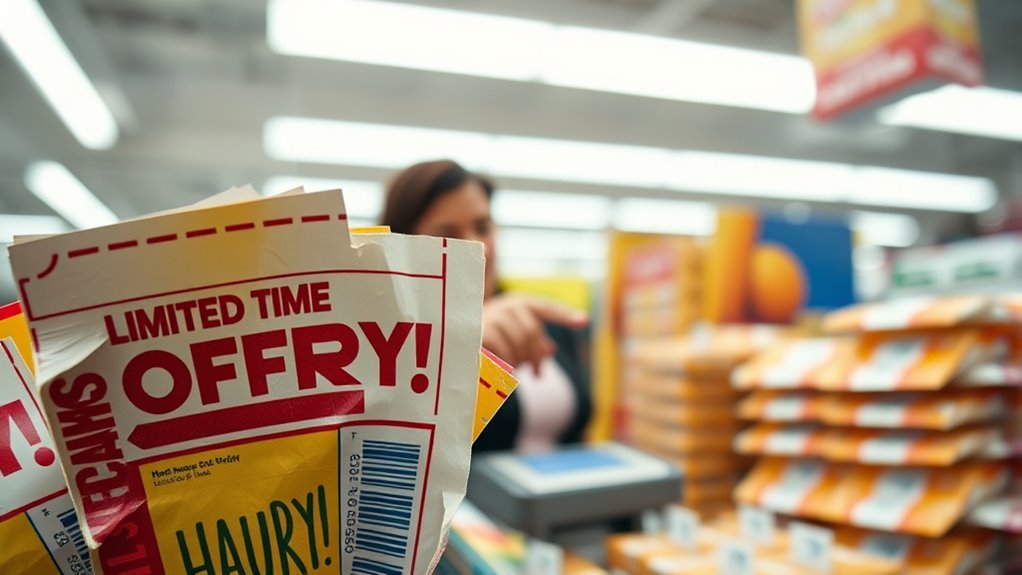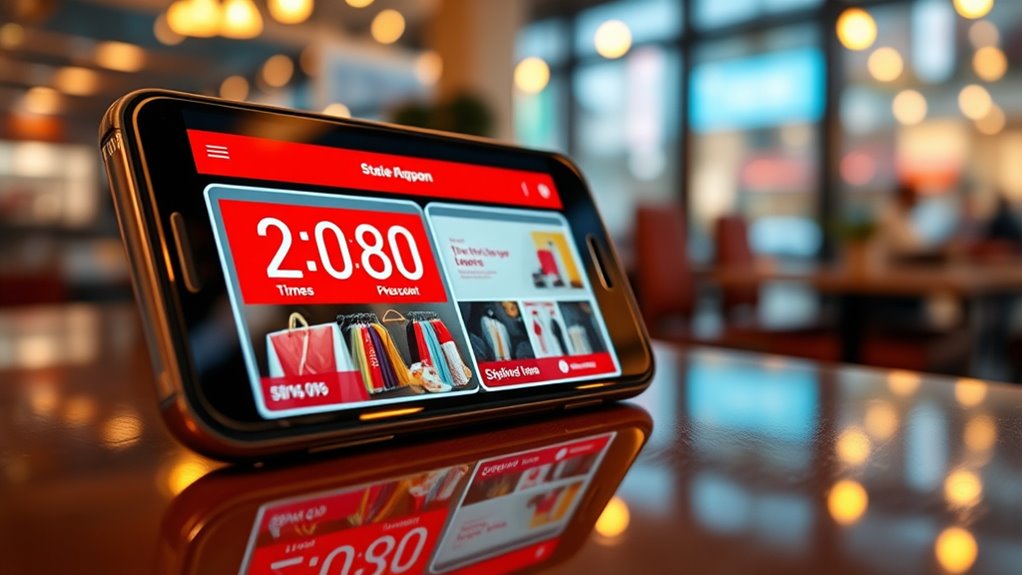Limited-time coupons are shrinking, limited in duration, limited in availability, and limited in impact. This trend reflects a strategic shift by retailers to create a sense of urgency, encouraging quick decisions and spontaneous purchases. But what’s driving this change, and what does it mean for your shopping habits? As businesses adopt more aggressive tactics, understanding these shifts becomes essential—so let’s explore the reasons behind this shrinking window of opportunity.
Key Takeaways
- Recent data shows a decline in the availability and duration of limited-time coupons across retailers.
- Companies are adopting shorter coupon windows to boost immediate sales and reduce consumer coupon fatigue.
- The trend toward fleeting offers creates urgency, encouraging spontaneous and impulse purchasing behaviors.
- Shorter coupon periods are part of strategic efforts to maximize profits and engagement through psychological triggers.
- Consumers need to act quickly, as shorter deals increase the likelihood of missing out if not vigilant.

Have you ever missed out on a great deal because you didn’t act fast enough? If so, you’re not alone. Recent data on coupon redemption trends suggests that limited-time coupons are shrinking in availability, and consumers are feeling the impact. Companies are becoming more strategic with their discounts, creating a sense of urgency that pushes you to make quick decisions. This shift isn’t random; it’s driven by a desire to maximize profits and combat coupon fatigue among shoppers.
Limited-time coupons are shrinking, boosting urgency and encouraging quick decisions to maximize profits and combat coupon fatigue.
You might notice that many offers now come with shorter redemption windows. Retailers and brands are intentionally reducing the duration of their coupons, knowing that the pressure to act fast increases the likelihood of impulse purchases. When coupons last only a day or two, it fuels consumer urgency—making you feel like you have to decide immediately or lose the deal forever. This tactic taps into the psychology of scarcity, compelling you to prioritize quick action over leisurely comparison shopping.
As coupon redemption trends lean toward brevity, you’re encouraged to stay alert and plan your purchases. The days of long, leisurely coupon periods are fading, replaced by rapid-fire offers that require you to stay on top of your inbox, app notifications, or store flyers. Many brands now rely on limited-time coupons to create a sense of exclusivity and increase immediate engagement. The idea is to catch you in the moment before the deal expires, which often results in higher conversion rates for businesses.
This trend also impacts your shopping behavior. You might find yourself more prone to making spontaneous decisions, driven by the fear of missing out. Retailers are aware of this consumer urgency, and they craft their coupons to capitalize on your natural tendency to act quickly when time is limited. The shorter the window, the more you feel compelled to act before the opportunity slips away. That’s the core reason why limited-time coupons are becoming more fleeting—they’re designed to trigger a swift response.
Additionally, the use of high-quality projectors in home theater setups can make these limited-time deals even more enticing, as consumers seek to enhance their viewing experience with sharp, vibrant images before the offer ends. Ultimately, the shrinking of limited-time coupons serves a dual purpose: it benefits businesses by boosting immediate sales and enhances the thrill of grabbing a deal just before it disappears. For you, it means staying vigilant and ready to pounce when the right offer appears. In a world where coupon redemption trends are leaning toward shorter durations, your best strategy is to act swiftly. The clock is ticking, and those fleeting deals won’t wait around for long.
Conclusion
You see the trend, you feel the shift—coupons are shrinking, urgency is rising, and deals are disappearing faster. You notice how retailers craft shorter offers to spark quick decisions, to create scarcity, to ignite FOMO. You recognize the strategy: less time, more action, greater engagement. As limited-time coupons become fleeting, your instinct to act fast grows stronger, turning urgency into opportunity and making every second count.








